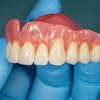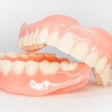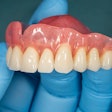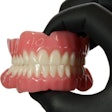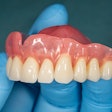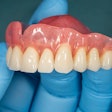
What is the level of oral health-related quality of life among elderly nursing home residents, and how does it relate to prosthetic needs? A new study investigated the relationship between these factors.
Researchers found that oral health quality-of-life levels were low and the need for denture-related treatment high, with certain factors placing nursing home residents at greater risk.
"The results of this study suggest that better oral health (more natural teeth and adequate prosthetic restorations), especially, is positively associated with acceptable oral health-related quality of life," wrote lead study author Anna-Luisa Klotz, DMD, and her colleagues from the University of Heidelberg in Germany (Clinical Interventions in Aging, April 11, 2017, Vol. 12, pp. 659-655).
The researchers were from the university's department of prosthodontics at the dental school, the Institute of Gerontology, and the geriatric psychiatry section.
Something to bite with
Nursing home residents have poor oral hygiene and health compared with younger and community-dwelling adults, according to previous studies. They are subject to more severe oral health problems, such as tooth loss, periodontal disease, caries, and xerostomia, the authors noted. Declining oral health can affect their ability to chew and take in nutrition, as well as exacerbate cardiovascular diseases and infectious respiratory diseases.
According to the researchers, the following factors can cause oral health deterioration in nursing home residents:
- Caregivers may have limited knowledge of the oral care needs of the elderly and insufficient time to perform them.
- Immobility can limit access to dental care providers.
- Oral health issues may be of low importance to the elderly themselves, due to multiple health issues, including dementia.
Oral health-related quality of life refers the absence of disease and also subjective well-being, and limited information is available about this in elderly nursing home dwellers. The researchers, therefore, conducted the current study to investigate the effects of prosthetic and dental status on oral health-related quality of life in these individuals.
They collected data on 169 elderly residents of 14 nursing homes in the state of Baden-Württemberg, Germany. The nursing homes encompassed rural and urban locations and varied in size. All residents were asked to participate.
The mean age of participants for whom complete data were collected was 82.9 years, and 67% were female. About 70% of the participants had dementia, defined as less than 24 on the Mini-Mental State Examination as administered by four psychologists. Participants had a mean of 3.5 diseases and took a mean of 6.7 medications.
The patients underwent a comprehensive dental examination by two dentists. The Revised Oral Assessment Guide (ROAG) was used to estimate their dental treatment needs, and the German version of the Geriatric Oral Health Assessment Index (GOHAI) was used to assess oral health-related quality of life.
The participants had a mean GOHAI score of 49.1, with 70 (41%) having a score of greater than 50, which indicates very compromised oral health-related quality of life. The total group had a mean of 8.3 natural teeth, with 32 wearing a fixed denture prosthesis, 37 wearing removable partial dentures, and 90 with complete dentures in at least one jaw. Ten were edentulous without teeth replacement in at least one jaw. Denture-related treatment was needed by 64% of the study participants.
Oral health-related quality of life was significantly associated with the type of prosthetic restoration -- decreasing in order from those with a fixed denture prosthesis to those with removable partial denture -- and complete dentures, as well as edentulism without teeth replacement, the researchers found. Lower numbers of natural teeth and greater amounts of dental treatment needed, as measured by the ROAG, significantly reduced oral health-related quality of life, they reported.
Among the 137 study participants who wore dentures (81%), the researchers found a greater need for denture-related treatment that was significantly related to lower GOHAI score. Additionally, edentulous subjects without prosthetic restorations had a 6.5-fold greater risk of extremely compromised oral health-related quality of life (GOHAI score of less than 50). Having fewer than five natural teeth doubled the risk of low oral health-related quality of life.
The oral health-related quality of life found in this study was substantially lower than in previous studies of community-dwelling elderly people, the authors wrote. Part of the reason for this could be that the nursing home residents were provided with extensive prosthetic restorations, which can produce functional and aesthetic compromises.
"With increasing number of natural teeth and the presence of fixed denture prosthesis, higher oral health-related quality of life was observed," the authors wrote.
They noted how reduced masticatory ability can affect food selection and that eating can be an important social event. Additionally, poorly fitting and less retentive dentures are associated with reduced chewing efficacy, while poor denture condition can result in psychological and social problems and affect oral health-related quality of life.
Don't bite off too much
The authors noted some reasons to view the study's results with caution. Forty percent of the initial study population dropped out. Some individuals may have participated because they had acute dental problems, and participants overall may have been more interested in their health than those who did not participate. The medical, psychological, and dental exams took around two hours, which was a concern for many individuals. Additionally, oral health self-assessment by elderly subjects with dementia may not be accurate and could underestimate oral health problems.
Periodic monitoring of oral health in nursing home residents, particularly since measurement of oral health-related quality of life might not be accurate in people with cognitive impairment, and frequent visits by dentists to nursing homes would help prevent oral health deterioration, the authors wrote.
"Prevention of tooth loss at an early stage and denture-related treatments (adjustment of dentures) seem to be important to maintain high oral health-related quality of life among the aged nursing home populations," they concluded.

